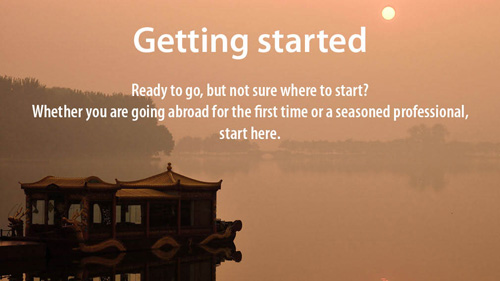Accommodation, Food & Beverage
The field of Accommodation, Food & Beverage is wide open to international professionals; and due to the global boom in the tourism industry, it’s only going to continue growing. Wherever travellers move in the world, they need two things: a place to sleep, and food and drink to consume.
If you have a genuine love for people, travel, and customer service, and you’re interested in making your living abroad, working at a hotel, B&B, eco-lodge, or within the restaurant, bar, café industries might be the perfect fit for you.
There are plenty of ways to break into the field by gaining an entry-level job, just as there are opportunities to work your way up to a managerial level, or transfer to a different area of the industry. The skills that help you succeed, including strong customer service, organizational management, marketing, or specialized skills, such as cooking, bartending, and so forth, are highly transferable to other people-related positions in the industry. Not only that: the hospitality and food industry, globally speaking, offers you unique opportunities to move from contract to contract, allowing you to fill up your passport with stamps and move around to different regions of the world.
What are some of the possible jobs and responsibilities in the industry?
Accommodation
- Concierge – Assists guests in making reservations at restaurants, arranging for spa services, booking transportation (taxi, buses, ferries, etc.), and providing recommendations for tours, recreational activities, and sightseeing.
- Front Desk Sales – Greets customers to take payment information, check people into their rooms, make reservations, and provide information to people about lodging services and services in the general area.
- Guest Services Manager – Manages all staff who work in front-desk and customer services by hiring for positions, overseeing responsibilities, and provides conflict management when issues with guests arise.
- Director of Hotel Operations – Oversees the entire operation of a lodging by managing staff, housekeeping, food service, security, public relations, and sales.
- Special Events Coordinator – Organizes entertainment and recreational events for guests at a particular lodging, including holidays and celebrations, booking musicians, dancers, and performers, coordinating games, classes, or lessons, and activities. May also be responsible for planning guest’s weddings.
- Groundskeeper – Plans and maintains the land surrounding a lodging by planting, weeding, mowing, irrigating, and pruning trees and hedges to ensure a functional and aesthetically pleasing landscape.
Food and Beverage
- Chef, or Head Cook – Oversees a kitchen where food is being prepared, cooked, garnished and plated for guests; some head chefs help design dishes on the menu; they also manage and train kitchen staff, including sous chefs, line-cooks, and even dishwashers.
- Line-Cook – Preps ingredients for head chefs and sous chefs by washing, chopping, cutting food items, and assisting chefs with salads, appetizers, and desserts.
- Restaurant/Café Manager – May vary locale to locale, but generally speaking, restaurant, or café managers are responsible for overseeing food prep and quality, and front of house staff, including servers, hosts, food runners, etc. Also responsible for taking inventory, order food and beverage supplies, and public relations.
- Wine Tasting Room Manager – Oversees the operation of a wine-tasting room; managing staff, providing customer service, answering questions about viticulture (cultivation of grapes), wine making process, and wines, in general. Responsible for sales, inventory, and public relations.
- Bartender – Provides customer service by taking orders from guests, mixing cocktails, serving wines, answering questions about types of alcohol, or drinks, etc.
- Server – May work at a restaurant, café, or for banquets, interacting with customers, taking orders, serving food, clearing dishes and tables, and providing constant care and attention for guests’ needs.
- Catering Manager – Overseeing preparation of orders, providing customer service, managing cooking/serving staff, ordering ingredients and supplies, ensuring quality of food, and transporting, or serving food to clients at events, or functions.
Who is working in the area of accommodation, food and beverage?
Over the past decades, Diana Morris, a Canadian entrepreneur, has been managing the Lazy Dog Inn, an eco-lodge in Huarez, Peru. She says there’s no such thing as a “typical day” when you work in the hospitality industry, and particularly when you’re working abroad. “I think it’s much more than a job,” says Morris. “It’s a lifestyle choice. If I wanted to ‘get rich’ from this job, I wouldn’t be here.” For Morris, as the manager, her responsibilities can go from dawn till dusk, as the guests who visit the Lazy Dog Inn have wide-ranging needs, interests, and requirements. “I cater to guests’ needs – they may want to go horseback riding, or hiking. I also have to manage our staff; to make sure they understand where they need to be, and what they should be doing,” says Morris.
“There’s always something to do, whether it’s preparing a meal, taking laundry off the line, or getting the sauna ready for guests. The whole thing goes from 6 am until 9, or 10 pm. That’s a typical day during the high season when we have a constant stream of guests.”
What Morris loves about the job, however, is the opportunity to work with local Peruvian staff members, and to meet a steady flow of visitors from all around the world. She also loves the opportunity to live in a unique mountain location. She takes advantage of her gorgeous location by waking early to go running in the hill, typically every morning. In the low-tourist season, she can get away to relax on Peru’s coastline, or travel back to Canada to visit family.
What skills and experiences help people succeed in the field?
Those who succeed in the field have excellent customer service skills; you’ll be personable, empathetic to guests’ needs, desires, and perspectives; and you’ll be able to communicate with a wide-range of guests. That might also mean that you’ll need to learn another language, particularly if you’re working in guest relations, or managing the front of desk sales.
Regardless of whether you’re working in a hotel, or a kitchen, you’ll need strong organizational and administrative skills. Those who succeed will be able to think quickly on their feet, solve logistical and HR issues that arise, and always be thinking several steps ahead of the operations. If you wish to enter the industry at a managerial level, you’ll need the academic credentials to back you up. Consider gaining a degree, or diploma in tourism/hospitality, or specifically in the culinary arts, or hotel management. Without the education, or certification, it’s still possible to enter at a lower position and gradually work your way up to the top. Potential employers will want to see that you have a resume of solid work experience in your home-country, or other countries around the world, and that you have the desire to learn on your feet.
Working abroad in the industry could prove challenging to those who stick only to what they know, or think is right. If you want to succeed, you’ll need to be open-minded and capable of learning the local business model and culture of the lodging, or restaurant, bar, or café. While many of the skills you’ll need are transferable from country to country, of course you’ll need to demonstrate to your employers that, above all else, you’re willing to learn in a new cultural work environment, and capable of collaborating with your employers and colleagues.
“You need to be someone whose flexible, adaptable, who can look at a situation and say, this isn’t ideal, how can I make it better?” says Amanda Gamel, an assistant manager at a winery and equestrian lodge in rural Chile. Gamel has worked in hospitality over the past 10 years, living abroad in Alaska, Nicaragua, and South America. “You need to have someone whose culturally aware, personal, open to learning new things, and open to admitting when something isn’t working and finding a way to change it.”
Who is hiring internationally?
- Private Hotels, Eco-lodges, B&Bs, Youth Hostels – Private lodgings offer a wide selection of positions, with various entry-levels. Larger lodgings will typically hire through recruiting agencies, or standard online application. With smaller lodgings, including B&Bs and youth hostels, you might charm owners/managers with your excellent people skills and get hired on the spot.
- Restaurants, cafés, bars – The food and beverage industry is constantly looking for various professionals, including head chefs, sous chefs, line-cooks, dishwashers, managers, servers, and bartenders. There is a high turnover rate in the food industry, so constantly be looking for openings. For executive positions, turn to the assistance of international recruiting agencies, but you can also find entry-level jobs and work your way up the line.
- Cruise liners, private yachts – There are a wide range of jobs in hospitality, food and beverage on cruise liners, including Princess Cruises, Carnival, and Disney Cruise Lines, amongst many others. Privately owned yachts also hire chefs, servers, bartenders, and guest relations managers, amongst many other professionals, to sail the seas. Check out yaCrew for up-to-date job listings.
- Inter-Governmental Organizations (INGOs) – The United Nations operates a branch of sustainable tourism called the World Tourism Organization (UNWTO). They offer entry-level positions for those interested in helping to shape policies, or suggested guidelines on global tourism opportunities, particularly in developing countries where economic development activities, and economic diversification is needed.
- Non-Governmental Organizations (NGOs) –Many development organizations are increasingly considering establishing sustainable community tourism initiatives to generate revenue for their grassroots community projects. If you have a background in tourism - particularly in the hospitality industry - you’d be well suited to find work as an advisor, or planner in helping NGOs to set up their own income-generating tourism initiatives. In Canada, look for internships with Global Affairs Canada, check out the International Youth Internship Program (IYIP). In the U.S., check out youth internship opportunities with USAID.
Resources
- Learn more about the World Tourism Organization (UNWTO), the United Nations agency responsible for the promotion of responsible, sustainable and universally accessible tourism. The UNWTO also offers unpaid internships to university graduates. Consider applying your background in tourism and hospitality to higher-level policies on global sustainable tourism development.
- Learn more about the Global Code of Ethics for Tourism, a comprehensive set of principles designed to guide key-players in tourism development. The GCET aims “to help maximize the sector’s benefits while minimizing its potentially negative impact on the environment, cultural heritage and societies across the globe.” Even if you’re interested to work in the private sector of hospitality and food, it’s important to consider the ethics of the tourism industry -- particularly if you plan to work in developing countries with high levels of social and economic poverty.
- If you’re looking for a managerial, or executive position, consider aligning yourself with a recruitment agency, check out Hunter International, a Canada-based search firm tailored for the international hospitality industry. Also visit Renard International, Global Hospitality, and/or Elite Search.
Job-Boards
- Caterer Global (‘Where Hospitality Finds Great People’)
- HCareers
- HRC International
- World Travel Organization (UNWTO)
Conclusion
A career in international hospitality is certain to be a rewarding one. Not only can you skip the regular 9 to 5 grind, but you’ll be able to meet a wide range of people. It’s Amanda Gamel’s favourite part of the job. “For me, the joy of working in hospitality is about finding connections between diverse groups of people.” What will you love about the industry?
Add to Favorites


